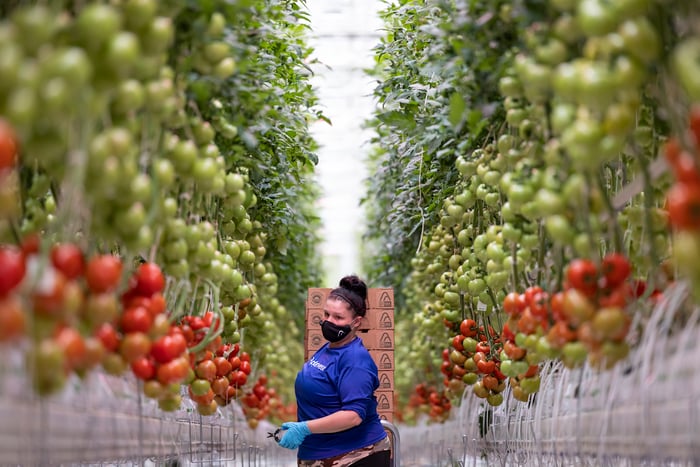Amid rising food prices and a general feeling of food insecurity in the air, high-tech indoor farmer AppHarvest (APPH) looks to resolve food issues in the U.S. using technology and ingenuity. But its stock has fallen nearly 95% from its all-time high in February 2021. Down but not out, here's how AppHarvest could turn things around and finally provide some upside to shareholders.
An operator and developer of controlled-environment indoor farms, AppHarvest wants to revolutionize agriculture as we know it. From its colossal Biodome-esque facility in Kentucky – nearly twice the size of Amazon's biggest distribution center – AppHarvest uses advanced technology including AI and robotics to increase efficiency and crop yields.
As CEO Jonathan Webb puts it, AppHarvest is "using technology, growing food with 90% less water, no agricultural runoff, getting 30 times yield per acre, and doing it year-round where we're not exposed to the climate issues that you see continuing to make it harder for farmers to grow outdoors." At present, AppHarvest grows earth-friendly, made-in-the-USA tomatoes with prices comparable to standard tomatoes.

Image source: AppHarvest
What is the company's growth outlook?
The stock plunged after AppHarvest reported a net loss of $166 million last year, including a non-cash goodwill charge of $60 million to write down its acquisition of Root AI, a robotics and artificial intelligence company. AppHarvest bought Root AI for its signature robot, Virgo, which can harvest, evaluate crop health, predict yields and optimize overall operations.
Another factor which pulled the stock down was historically low tomato prices in 2021, which led to a $30 million net loss in the second quarter. Additionally, AppHarvest's management announced a steep reduction in sales expectations, from $20 million-$25 million to $7 million-$9 million for 2021. Investor confidence is at or close to an all-time low.
But despite AppHarvest operating deep in the red, the company's leadership remains optimistic about turning cash positive. Looking ahead, AppHarvest is on track to quadruple its facilities by the end of 2022. It has plans for three additional farms, which are expected to be fully operational by Q1 2023.
Indeed, AppHarvest's first quarter results show promise, with sales increasing 125% over Q1 of 2021. AppHarvest currently sells tomato varieties, but it plans to add salad greens and berries to its offerings once the new facilities are operational.
How can a public company focused on sustainability compete in a crowded space?
Putting sustainability before profitability is noble, but it could hurt AppHarvest's revenue. While most public companies are driven by profitability, AppHarvest has chosen to make sustainability a priority. According to a study conducted by Kraft Heinz this year, 75% of consumers want brands to conduct their businesses more sustainably, so perhaps AppHarvest is onto something.
With the help of colleagues in the Netherlands, Webb and his team created an ecosystem in the U.S. based on what's been developed in the thriving Dutch greenhouse industry. The Netherlands is second only to the US in agricultural exports, which is pretty incredible for a country one-third the size of Kentucky. The Dutch are known for being innovators in sustainable agriculture.
One of AppHarvest's main footholds in the indoor growing space is the sheer size of its facility. Growing vertically in a massive indoor space allows for rapid scalability and adaptation to varying market conditions and demand levels. In other words, AppHarvest's success relies heavily on its ability to scale rapidly.
But with fierce competition among agricultural companies, any missteps in AppHarvest's growth projections could severely impair investor confidence. If it's unable to build farms and scale production as quickly as it has projected, the company could soon find itself in a pickle.
Despite the risks, AppHarvest seems to have a solid management team in place. CEO Jonathan Webb is bold, charismatic, and has a genuine concern for the planet. And as the largest shareholder with 18% of shares outstanding, Webb has plenty of skin in the game himself.
With aggressive expansion plans, AppHarvest has the potential for a bright and abundant future. If it can meet its timelines and remain competitive, AppHarvest's stock could be a candidate for recovery in the near future.





